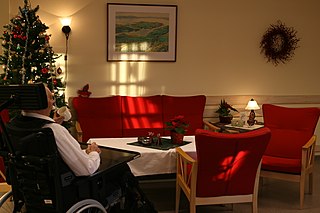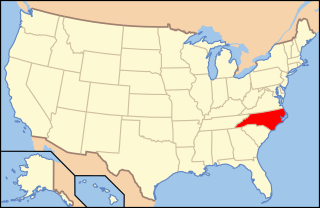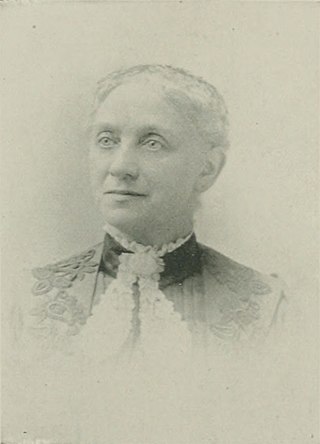
Medicaid in the United States is a federal and state program that helps with healthcare costs for some people with limited income and resources. Medicaid also offers benefits not normally covered by Medicare, including nursing home care and personal care services. The main difference between the two programs is that Medicaid covers healthcare costs for people with low incomes while Medicare provides health coverage for the elderly. There are also dual health plans for people who have both Medicaid and Medicare. The Health Insurance Association of America describes Medicaid as "a government insurance program for persons of all ages whose income and resources are insufficient to pay for health care."

Cedar Rapids is the second-largest city in Iowa, United States and is the county seat of Linn County. The city lies on both banks of the Cedar River, 20 miles (32 km) north of Iowa City and 100 miles (160 km) northeast of Des Moines, the state's capital and largest city. It is a part of the Cedar Rapids/Iowa City region of Eastern Iowa, which includes Linn, Benton, Cedar, Iowa, Jones, Johnson, and Washington counties.

Long-term care (LTC) is a variety of services which help meet both the medical and non-medical needs of people with a chronic illness or disability who cannot care for themselves for long periods. Long-term care is focused on individualized and coordinated services that promote independence, maximize patients' quality of life, and meet patients' needs over a period of time.
The California Medical Assistance Program is California's Medicaid program serving low-income individuals, including families, seniors, persons with disabilities, children in foster care, pregnant women, and childless adults with incomes below 138% of federal poverty level. Benefits include ambulatory patient services, emergency services, hospitalization, maternity and newborn care, mental health and substance use disorder treatment, dental (Denti-Cal), vision, and long-term care and supports. Approximately 13.3 million people were enrolled in Medi-Cal as of January 2018, or about one-third of California's population; in Tulare County and Merced County, more than 50% of county residents were enrolled as of September 2015.
A group home, congregate living facility, or care home is a residence model of medical care for those with complex health needs. Traditionally, the model has been used for children or young people who cannot live with their families or afford their own homes, people with chronic disabilities who may be adults or seniors, or people with dementia and related aged illnesses. Typically, there are no more than six residents, and there is at least one trained caregiver there 24 hours a day. In some early "model programs", a house manager, night manager, weekend activity coordinator, and four part-time skill teachers were reported. Originally, the term group home referred to homes of 8 to 16 individuals, which was a state-mandated size during deinstitutionalization. Residential nursing facilities, also included in this article, may be as large in 2015 as 100 individuals, which is no longer the case in fields such as intellectual and developmental disabilities. Depending on the severity of the condition requiring one to need to live in a group home, some clients are able to attend day programs and most clients are able to live normal lifestyles.
Florida has several Medicaid Waiver Programs. Medicaid Waiver Programs allow recipients to 'waive' institutionalization and instead choose to direct services to assist them to live in the community. Waiver program services may offer additional supports and services than provided by traditional Medicaid.

Nan Wood Graham was an American artist and art teacher. She was the sister of painter Grant Wood. She is best known as the model for the woman in her brother's most famous painting, American Gothic (1930).

This is a list of the National Register of Historic Places listings in Linn County, Iowa.
La Rabida Children's Hospital is a small pediatric specialty hospital for extended acute care that caters to children with lifelong medical conditions. Located on the South Side of Chicago on Lake Michigan, the facility is designed to showcase its lakeside views. La Rabida serves approximately 9,000 children annually who require primary and specialty care to address complex and challenging medical conditions. The hospital provides care to all patients regardless of the family's ability to pay. Services and programs include treatment for chronic illnesses such as asthma, diabetes, sickle cell disease, and developmental disabilities. In addition, La Rabida specializes in the treatment of children who have been abused, neglected or experienced trauma.

The state of North Carolina is undertaking a comprehensive policy shift on how the government budgets for and manages resources for mental health, developmental disability, and substance abuse services. The 1915 (b)(c) Medicaid Waiver Program was chosen by the North Carolina Department of Health & Human Services, Division of Medical Assistance as a way to control and more accurately budget for the rising costs of Medicaid funded services. The 1915 (b)(c) Waiver Program was initially implemented at one pilot site in 2005 and evaluated for several years. Two expansion sites were then added in 2012. Full statewide implementation is expected by July 1, 2013.
Family support is the support of families with a member with a disability, which may include a child, an adult, or even the parent in the family. In the United States, family support includes "unpaid" or "informal" support by neighbors, families, and friends, "paid services" through specialist agencies providing an array of services termed "family support services", school or parent services for special needs such as respite care, specialized child care or peer companions, or cash subsidies, tax deductions or other financial subsidies. Family support has been extended to different population groups in the US and worldwide. Family support services are currently a "community services and funding" stream in New York and the US which has had variable "application" based on disability groups, administrating agencies, and even, regulatory and legislative intent.
The Utah HCBS waiver program is a state-run program that serves individuals in Utah with intellectual disabilities or related conditions (ID/RC). HCBS stands for Home and Community-Based Services.
Medicaid Waiver programs help provide services to people who would otherwise be in an institution, nursing home, or hospital to receive long-term care in the community. Prior to 1991, the Federal Medicaid program paid for services only if a person lived in an institution. The approval of Federal Medicaid Waiver programs allowed states to provide services to consumers in their homes and in their communities.
As of 2017, approximately 1.4 million Americans live in a nursing home, two-thirds of whom rely on Medicaid to pay for their care. Residential nursing facilities receive Medicaid federal funding and approvals through a state health department. These facilities may be overseen by various types of state agency.
Jennifer Velez is the former Human Services Commissioner for the state of New Jersey. As Commissioner, it was she oversaw New Jersey's Department of Human Services. She served as Commissioner from 2007 to 2015 under Governors Jon Corzine and Chris Christie.

A Katie Beckett waiver or TEFRA waiver is a Medicaid waiver concerning the income eligibility for home-based Medicaid services for children under the age of nineteen. Prior to the Katie Beckett waiver, if a child with significant medical needs received treatment at home, the child's income would be deemed to include the parents' entire financial resources for the purposes of determining Medicaid eligibility. Only after a hospitalization lasting more than thirty days would the parents' income no longer be associated with the child, allowing the child to then qualify for Medicaid coverage. The effect was that many families, unable to afford home treatment, kept their children in costly hospital settings in order to meet the Medicaid 30-day requirement. Katie Beckett waivers allow Medicaid to cover medical services for children in the home, regardless of the parents' income, in cases where home-based treatment will cost less than or the same as treatment in a hospital.

Mary Jane Aldrich was an American temperance reformer, lecturer, and essayist of the long nineteenth century. She served as vice-president of the National Woman's Christian Temperance Union (WCTU) and president of the Iowa union. At the time of the division in the ranks of the WCTU, Aldrich, with the Iowa union, adhered to the non-partisan temperance work, and became evangelistic secretary of the Non-Partisan National Woman's Christian Temperance Union. As a temperance worker, she was characterized as sanguine and practical. As a speaker, she was bright, forceful, entertaining and logical. She was the author of "Church and Sunday School Temperance Work" (1898).

Marilyn E. Saviola was an American disability rights activist, executive director of the Center for the Independence of the Disabled in New York from 1983 to 1999, and vice president of Independence Care System after 2000. Saviola, a polio survivor from Manhattan, New York, is known nationally within the disability rights movement for her advocacy for people with disabilities and had accepted many awards and honors for her work.
Mildred Hope Fisher Wood was an American teacher and a pioneer in special education. Wood was also an author and newspaper column writer. She received multiple honors.
Barbara Hillyer or Hillyer-Davis was the founding director of the Women's Studies courses at the University of Oklahoma. Her 1993 book, Feminism and Disability was the 1994 Emily Toth Award winner for the best feminist publication of the year and was also named as Outstanding Academic Book by the Association of College and Research Libraries's Choice Magazine. Her work explored the response of the disability and feminist rights movements to aging, chronic illness, disability, and mental health.










